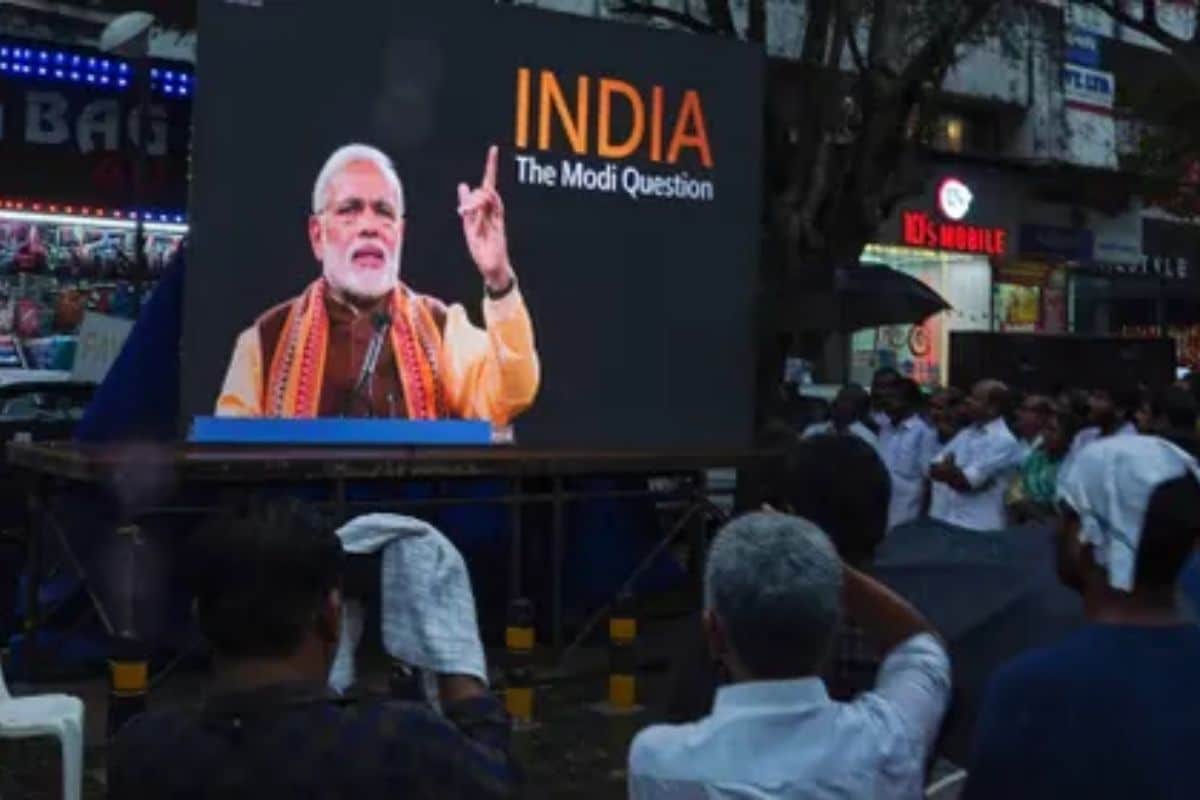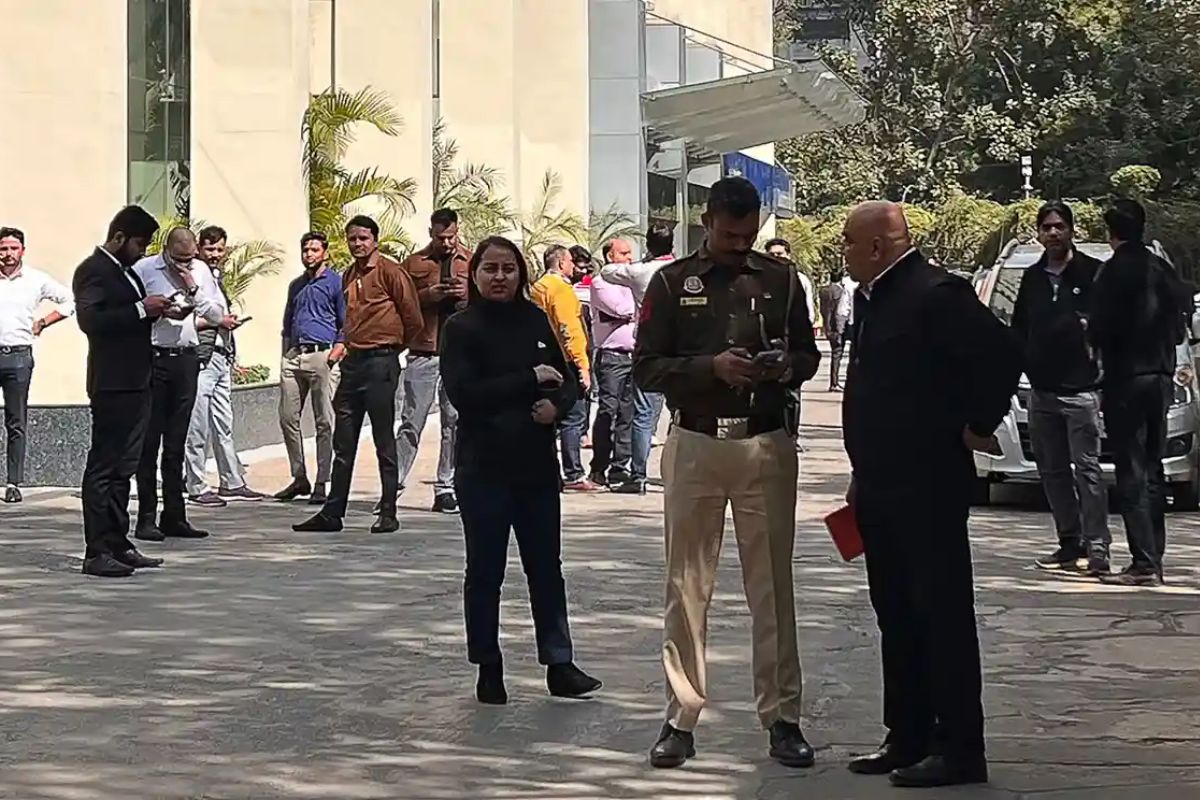A BBC documentary about what the Indian prime minister, Narendra Modi, did during deadly sectarian riots in 2002 is still causing trouble. On Tuesday, India’s tax officials went to the offices of the British broadcaster to look for tax evaders. What is the documentary about, and why is it so controversial?
What Is The BBC Documentary About?
India: The Modi Question is a two-part series that aired in the UK in January. It looks at the growing tensions between the Indian prime minister and the country’s Muslim minority.
Since Modi was elected in 2014, his Bharatiya Janata Party (BJP) has pursued Hindu-centered policies that have been accused of targeting and discriminating against India’s 200 million Muslims as part of a right-wing religious nationalist agenda that is moving India away from its secular roots.
In the documentary’s first episode, allegations from when Modi was Gujarat’s chief minister 20 years ago are brought up again. During this time, 60 Hindu pilgrims died when someone set fire to their train car. There was disagreement about what started the fire, but the Muslim community was blamed, and this led to a wave of bloody violence in which Hindu mobs attacked the homes of Muslims all over the state. During the riots, more than 1,000 people died, most of whom were Muslims.
In the wake of the violence, Modi’s state government was blamed for encouraging the Hindu mobs and telling the police to stay out of the way while Muslim homes were attacked. Allegations that he was involved in the communal violence have followed Modi for years. He was banned from entering the US because of “very serious doubts” about his role.

In 2012, a Special Investigation Team (SIT) put together by the highest court in India found no evidence that Modi was involved in the violence. This decision was upheld in 2022. After Modi was elected prime minister in 2014, the US lifted its ban on him getting a visa.
What Has New Information Been Uncovered By The Documentary?
For people who have been paying close attention to Indian news, the documentary’s claims about Modi and the Gujarat riots are not new. They were widely reported at the time and have been written about in many books since. But for international audiences who didn’t know much about Modi before he became prime minister, it was one of the first to show his rise to power, the controversies surrounding it, and how they fit into his current government agenda.
The documentary got access to a confidential UK government report made after the riots that had never been seen before. The report blamed Modi for the violence and said the riots had “all the signs of ethnic cleansing.” A damning interview with Jack Straw, who was the foreign secretary of the UK at the time, was also part of the documentary.
Straw said, “These were very serious claims that Mr. Modi had taken the initiative to pull back police and to encourage Hindu extremists in a subtle way.” “That was an especially bad example of politics getting in the way of police doing their jobs to protect Hindus and Muslims.”
How Has The Government Of India Responded?
The Modi government quickly and clearly said that what had happened was wrong. During the foreign ministry’s weekly press conference, a spokesperson said that the BBC’s “bias, lack of objectivity, and frankly, continuing colonial mindset are all over the place.” The spokesperson also said that the BBC was trying to hurt the government.
Kanchan Gupta, who works for the Ministry of Information and Broadcasting, said it was “propaganda and anti-India garbage dressed up as a documentary.”
Not long after that, the government used emergency laws to stop people from sharing links and clips of the documentary online. YouTube and Twitter did what they were told to do. It is not the first time in the past year that the law has been used to block online content that is critical of the government, but it is the most well-known.
Several BJP politicians said that the BBC was trying to hurt Modi by bringing up accusations from 20 years ago that the courts had already thrown out. A petition to stop the BBC from working in India was sent to the supreme court, but it was turned down.
Student groups all over India set up screenings of the documentary in response to what seemed to be censorship. Still, they were arrested, attacked by right-wing groups, and accused of “treason.”
The BBC has stood by the documentary, saying it was “rigorously researched according to the highest editorial standards.”

Why Has The Indian Government Expressed Such Outrage?
The documentary comes out at a time when India’s place on the world stage is essential. It is currently hosting the G20 meeting and trying to show that it is the “mother of democracy.” As the leader of the world’s second-largest country, which is now likely to be the largest, with an economy bigger than the UK’s, Modi is being courted by western powers more and more on issues of geopolitics and the environment, and his growing popularity abroad is helping him win votes at home.
But the BBC documentary shows alleged past atrocities and current discrimination against minorities that the US, UK, and Europe have been accused of ignoring as they make trade deals and close alliances with India. This could cause problems in the future for these relationships.
People in India say that old colonial powers in the west, unhappy with India’s rise, are trying to stop it from becoming more important by bringing up old accusations.
India will vote for a new government next year. Most people think Modi will win because he is very popular, especially among Hindus, who make up 80% of the population. However, this is still a very important time for the government.
The Modi government has also been known to take criticism from other countries very severely. Greta Thunberg, a climate activist, and the singer Rihanna were both criticized for speaking out. They both said they supported farmers who were protesting against Modi’s policies, which led to a harsh statement from the foreign ministry.
What Have Been The Implications For The BBC?
India’s right-wing media and social media accounts with a lot of followers started to attack the BBC for what they said was its bias.
Even though the documentary was well-liked in the UK—the Guardian called it “a sobering look at how Narendra Modi treats India’s Muslims”—some people had questions about it.
Bob Blackman, a Conservative MP with close ties to the Modi government, which was given India’s highest honor in 2020, called the documentary a “hatchet job.” Rami Ranger, a member of the House of Lords, wrote to the head of the BBC to complain about the film and ask “if your Pakistani-origin staff were behind this nonsense.” Chris Elmore, a Labour MP, said it was unacceptable for the Tory peer to “put pressure on the BBC in this way.” He also said Ranger’s comments about Pakistani journalists were racist and wrong.
On Tuesday, more than a dozen government tax officers raided the BBC’s offices in Mumbai and New Delhi. They said it was a “survey” of operations. As part of an investigation into tax evasion, phones and laptops were taken, and the offices were locked up. Many people saw this as a way to punish them.
The BBC said it would help with the investigation in a short statement.
Human rights groups and press groups made strong statements in response to the raids. The Committee to Protect Journalists Asia coordinator, Beh Lih Yi, said, “Indian authorities have used tax investigations in the past as an excuse to go after critical news outlets. They must stop harassing BBC employees right away, in line with the values of freedom that should be upheld in the world’s largest democracy.”
Be Entertained and informed with the latest news at techeducation.com! From the hottest trends to the most breaking news. And Also, Follow us on social media: Facebook, Pinterest, Twitter, and Linkedin. And be part of the movement! Share your thoughts, ideas, and opinions with us.

